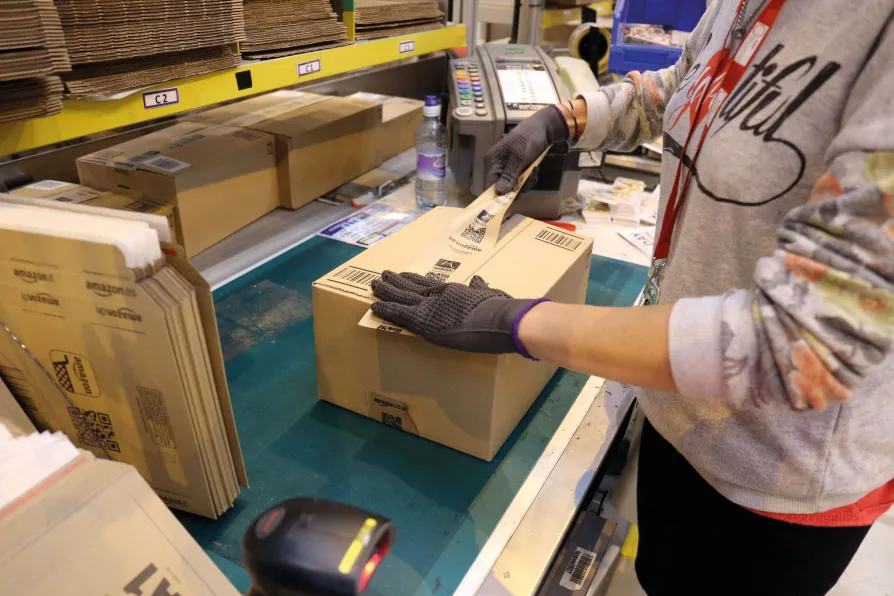The language of humiliation is a step towards a second civil war, argues RAMZY BAROUD
TONY BURKE explains how an internationally significant breakthrough for workers’ organisation and recognition against two notoriously anti-union global mega corporations has been finally achieved in Canada

 HISTORIC: Amazon has long prevented workers from organising
HISTORIC: Amazon has long prevented workers from organising
IN JULY, the British Columbia Labour Relations Board (BCLRB) in Canada certified that the 250,000-strong United Food and Commercial Workers union (UFCW-Canada) will be recognised for collective bargaining for over 500 Uber drivers in British Columbia’s capital city, Victoria.
Days later, the BCLRB issued another decision which awarded Unifor (the manufacturing and engineering union) the rights to collective bargaining for hundreds of workers employed at an Amazon distribution centre in Vancouver.
The union wins at two of the most anti-union global companies were achieved because the unions were able to utilise simple legal rules in the British Columbia Labour Relations Code. In Canada, labour relations fall primarily within provincial rather than federal jurisdictions.
The 250,000-strong UFCW won at Uber almost without a fight after benefitting from two legal rules in the British Columbia labour legislation. The first rule is card-check certification. British Columbia is one of five (of 11) Canadian jurisdictions that permit labour boards to grant union recognition to a union based on union membership evidence that they represent a majority of employees in a bargaining unit.
The UFCW was certified after the BCLRB confirmed that the union had submitted evidence that its membership represented more than 55 per cent of drivers in the bargaining unit — the required threshold in the Labour Relations Code. The BCLRB ruled there was no need for a vote and was satisfied the union had majority membership.
A second legal rule which helped the UFCW is one where “dependent contractors” are treated as “employees” for the purposes of collective bargaining.
Canadian labour relations legislation defines an “employee” as “including a dependent contractor” and then defines “a dependent contractor” broadly to include workers who, regardless of whether they meet the legal tests for “employment” status, stand in a position of economic dependence such that they “more closely resemble an employee than an independent contractor.”
While the question of whether platform workers such as Uber drivers meet the legal test of “employment” remains a live question in Canada, there was little doubt that they are “dependent contractors” and therefore would be covered by collective bargaining legislation.
Confronted with the law, Uber didn’t argue that its drivers were independent contractors in Victoria, and so the drivers had to be recognised and have collective bargaining, making this the first unionised unit of Uber drivers in North America.
Amazon, after learning of Unifor’s organising campaign, cranked up its tried and tested anti-union campaign of inflating the number of employees in the bargaining unit with “new hires” which would leave the union short of a majority, as well as workers facing a campaign against collective bargaining via posters, leaflets, videos, phone calls, and emails, and group and one-on-one conversations at work.
Amazon used a “field team” of senior management personnel from across North America to stop union organising.
They failed as the BCLRB ruled that Amazon had made “implied threats” that employees may lose benefits they currently have if the union was certified.
Having made the ruling that Amazon acted unlawfully, the BCLRB acted quickly and ordered union recognition as a remedy for “serious employer unfair labour practices,” and union recognition was warranted given Amazon’s anti-union campaign, coupled with numerous additional unnecessary and artificial hiring of new workers.
Remedial certification is rarely ordered in Canada — the Amazon order is just the 14th remedial certification granted by the BCLRB since 2014 — but it serves as a significant disincentive for companies to break the law during organising campaigns, and the law in British Columbia, which is simple and straightforward, should be a model that other unions (including in Britain) should be campaigning for.
Information contributed by Dr David Doorey, Professor of Labour and Employment Law at York University, Toronto and first published on the onlabor.org website.
Tony Burke is co-chair of the Campaign for Trade Union Freedom — tradeunionfreedom.co.uk.










